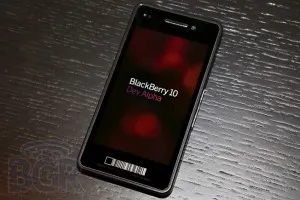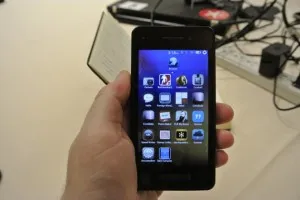“BlackBerry is the most monetizable platform out there for developers,” Annie Mathew, Director, RIM, India and SAARC
The volatile mobile ecosystem hasn’t spared anyone. Giants and minnows alike have either rode the wave of the mobile OS era or have been swept away by it. RIM has borne the brunt of rapid disruption in the mobile ecosystem and has been in the wilderness for a while, reinventing itself. Post the launch of the moderately successful Playbook, RIM is back in the news with a preview of BB10, their latest OS. Scheduled for a 2013 Q1 launch, BB10 looks like an
exciting prospect. The leaks of some BB10 devices on the internet, look radically different, suggesting a complete overhaul of their design philosophy and a heavy emphasis on providing a great user experience. It boasts of top of line features which goes toe to toe with any of the current market leaders and BlackBerry’s new approach to the mobile device has had critics and users eagerly looking forward to its release.
We at YourStory caught up with Annie Mathew, Director, Alliances and Business Development at Research In Motion, SAARC, and got a detailed insight into the inner workings of RIM India, its plans for the enterprise market, the new BB 10 OS, its developer initiatives in India and its plans for the Indian ecosystem on the whole.
[Edited excerpts]
YS: What does your role as Head of Business Development and Alliances entail in India?
Annie: I take care of alliances and BD for India and SAARC, and a good part of my work goes into building the BlackBerry ecosystem. This includes working on partnerships with small companies that are into the app development space, third party developer groups and the larger developer communities working on the BlackBerry ecosystem. I also work on reaching out to newer sets of developers, such as students; the age of the developers has gone down and today we have 13 - 14 year olds making apps.
The ecosystem has two sides to it; a consumer front and an enterprise front. The consumer front’s results show in the app world. Developers submit their apps to the marketplace and thats the most direct point of consumption for a BlackBerry consumer. So we help the developers with the go-to-market process for app development and help them out in keeping their app relevant to the BlackBerry customers and with other areas such as pricing etc.
We also work with partners who work on some of the newer features in BlackBerry such as NFC and AR. For example, Sky Park Cafe in Hyderabad is completely powered by an NFC enabled BlackBerry ecosystem with social integration. This is an example of the kind of partnerships that we were talking about.
We work with enterprise app developers as well.
YS: From your experience of working with developers, what are some of your observations about the Indian mobile ecosystem?
Annie: I think the focus is shifting from the technology to the user experience. Now the technology is still very important, but if you see the apps that get downloaded the most, it’s either because they have very strong content or an amazing user experience. Developers all over have become aware of that and are focussing on this aspect.
That is something that we are doing with BB10. Before this, you would have to develop a BlackBerry app either in J2ME or more recently HTML5. With BB10, developers can work on whatever programming language that they know and it can be ported to be compatible with a BB10 device. So the developers can now worry less about learning the technology and concentrate more on providing the end user with a better user experience.
YS: What are some of the most immediate plans that you have for the BlackBerry ecosystem in India?
Annie: I think the focus is going to be on our fundamentals; the developers. Over the last three years, we have grown from a mere 3000 BlackBerry developers to over 38000, and this is the general direction that we’ll be heading in. How we did this is by extensively providing training support, device support, being there when they needed help on go-to-market and how to market their apps better. This is our mainstay and this will continue.
The thing with BlackBerry 10, is that people can code BB apps in whichever programming language they are comfortable with. This means reaching out to a new set of developers and this will be something we are going to be working towards. A lot of our time will be invested in educating developers who come from a different ecosystem as to what the BB user experience is and how to integrate the host of BB services to make their apps more efficient.
Last year we ran a program called BASE, which was BlackBerry apps for student entrepreneurs, which we ran in Tamilnadu, and this year, we have set up RIM Innovation Labs which we launched at Startup Village Kochi, which was the first of its kind in Southeast Asia before the launch of the one in Indonesia. We did this to promote entrepreneurship among students as that is the age where the tendency to take risk is maximum and cost of failure is not much. Furthermore, the Kerala Government has offered 15% attendance exemption for student entrepreneurs, much like sports quota. RIM is working very closely with them on this initiative.
YS: Is BlackBerry looking to phase out the QWERTY keyboard form factor and replace it with touch? Is this driven by customer need?
Annie: At launch, we will be selling both touch and type devices. The videos that have come out are only showing the touch phones, but there’s news out

there which is showing some touch and type devices as well. The QWERTY keyboard is something that BlackBerry is known for and we will be keeping that in the coming updates, but I must say, from what I have seen, the touch experience on a BB10 device is exceptional.A lot of our customers want a larger touch screen device to use and a significant portion of our offering will be touch. But having said that, we will also offer touch and type devices as well.
YS: You had said that BB10 will support multiple programming languages to build apps. Are these ports or can developers build native apps using other languages? Will these ports affect the performance of apps on BlackBerry devices?
Annie: So its a bit of both. Some languages like HTML and C++ can be used to code native apps while the other languages are ports. The idea is to cater to as many programmers as possible and I think the corollary is also true; most developers aren’t making apps for one device any more and they are looking for as many platforms where their apps can run on.
As far as performance goes, I think a savvy developer will use the right kind of APIs so as to optimize the experience of a ported app on a BlackBerry device.
YS: Why doesn’t RIM charge a developer fee to put up apps on the BB App World?
Annie: That is RIM’s commitment to the developer community. We have invested a lot into the developer community and this is just one part of it. In fact, we’ve made a bigger commitment with BB10, where we have committed $10,000 to everyone who’s made at least a $1000 dollars on the app world.
This decision is analytics based and if the reports of how apps have performed on 7.0 and PlayBook are anything to go by, then we believe that one can actually make that kind of money on BlackBerry. There are many reports out there which state that BlackBerry is the most monetizable platform out there. So these are the kind of investments that we are making in the developer community. It is for the long term play right? We have a loyal customer based and these investments will give them better apps to use.
YS: Now that use of smartphones are no longer restricted to the business class,has BlackBerry’s approach towards sales changed?
Annie: Yes, it has grown out of business. The youth is definitely a large market now and even in the enterprise segment, the whole BYOD syndrome has changed the way devices are sold right? So yes, a lot of focus has shifted to the retail.
But one thing that I’d like to point out here is that BlackBerry market is action oriented. While in other cases, devices were first consumption based and then moved into creation, BlackBerry has always been a action oriented device and with that respect, I don’t think sales approach has changed that much.
YS: What is BlackBerry’s stand on the use of open source technology in its ecosystem?
Annie: You will see that with BB10, we have embraced way more technologies. I’ve already told you about how you can use different programming languages to code on BlackBerry 10 so this should be a little indicative of where our strategies lie. We have seen ecosystems that are completely open and others that are completely closed and both have issues inherent to them. We are somewhere in the middle, with a little bias to open source. We’d like to have a sort of a curated open source stand, if you like.
YS: What would be your 3 pieces of advice to app developers and app development companies in India?
Annie: Content and user experience is going to be paramount, so keep an eye out for these things. My advice would be to not perfect and polish an app before the nth level before publishing it, and keep things simple. We’ve worked to make BB10 very simple and intuitive to use and if the app development aligns to that, you cannot go wrong.
Put out a version of the app; do a soft launch of your app and get feedback and use it to improve your app theron. Once your app is out there, keep your eyes on it and see how it performs.
And my third advice is, well, market market market! Once your app is published, use every avenue possible to distribute your app. Marketing is a very important thing once your app is made.
YS: As a sign off note, what is the biggest advantage for a smartphone user if they are to shift to BB10?
Annie: A very good user experience; I think this is the biggest advantage a BB10 user will have. We have endeavored to make the BB10 experience

unified and seamless so that the user does not have to go through the hassles of switching from one app to another through apps like the Hub. You will see and hear more about this in the coming months.During our conversation, Annie had shared that the notion that BlackBerry is out of the market is a very North American thought and that it still had a very loyal user based in other parts of the world and India was one of them. Add BB10 to an already loyal customer base, we might just see a change in market share proportions come 2013.
We at YourStory.in are looking forward to BB10, its devices and what it entails for the developers, and we wish Annie and RIM all the best with it! Stay tuned, we shall bring you regular updates!
Want to know what the next big thing the mobile Industry has for India? Register your seats for MobiSparks now!








![[Startup Bharat] This Indore-based security startup is securing your infrastructure data using a hacker’s point of view](https://images.yourstory.com/cs/2/a9efa9c0-2dd9-11e9-adc5-2d913c55075e/startup-bharat-feature-img21550042933391.jpg?mode=crop&crop=faces&ar=1%3A1&format=auto&w=1920&q=75)